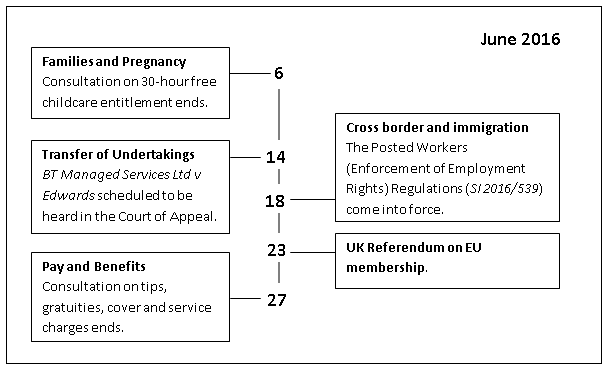Three major Bills affecting employment law received Royal Assent this month, becoming the Trade Union Act 2016, the Enterprise Act 2016 and the Immigration Act 2016, the last of which creates new immigration offences from 12 July 2016. Compared to last year, the Queen’s speech contained little for employment lawyers, besides the recycled promise of a British Bill of Rights, which was considered recently by the House of Lords EU Committee.
It was a bad month for interpreters in the Court of Appeal. Local interpreters working for the British Army in Afghanistan were not covered by the Equality Act 2010 because they did not satisfy the territorial jurisdiction test in Lawson v Serco. And the lack of an umbrella contract was a relevant factor in deciding that court interpreters working for the MoJ were not in “employment” under the EqA 2010.
Meanwhile, the High Court ordered confidential information taken away by ex-employees on their computers and phones to be destroyed by an independent expert.
The EAT has considered causation in a discrimination arising from disability claim, and held that a Christian teacher suffered indirect religious discrimination when she was dismissed for refusing to divorce her sex-offender husband. It also held that injury to feelings awards are not available for failure to provide rest breaks under the Working Time Regulations 1998.
The government launched a consultation on tipping, a call for evidence on the labour market barriers faced by BME workers and another on whether non-compete clauses are stifling the “startup economy”. A consultation on grandparental leave had been expected by the end of the month but we understand has now been delayed until after the EU referendum.
In the news, unions announced a compensation deal for blacklisted construction workers, and a receptionist created a social media storm when she was sent home for not wearing high heels, leading to over 140,000 signatures on a government petition. Citizens Advice reported that requests for advice on pregnancy discrimination rose by 25% in the past year, and Acas has reported on the effectiveness of early conciliation.
Blog
In our blog, Penelope Jarvis made data subject access requests less painful, Benjamin Gray provided tips on requests for further information in the ET, Shireen Shaikh considered the tension between express contractual rights to summarily dismiss and statutory minimum notice, and Georgina Hirsch looked at the ET’s power to strike out for intimidatory behaviour.
Next month
Key developments to look out for in June 2016.

For more on the referendum see our EU Referendum landing page. Finally, for recent and forthcoming developments, don’t forget What to expect in employment law, Case tracker and Legislation Tracker.



